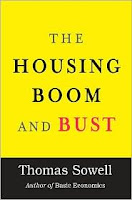Creative Financing

One of the biggest factors that contributed to the housing boom and bust was the federal government's attempt to make housing "affordable" for everyone. Members of Congress from both political parties have urged federal regulatory agencies to press banks and other lenders to lower mortgage loan requirements, and have passed legislation to that end and to subsidize or guarantee loans made under lowered standards. (p. 30) Banks and other lending institutions have learned by experience that certain standards must be met by borrowers in order to protect themselves against the risks of default. Traditionally, one of these requirements has been a substantial down payment, usually in the neighborhood of 20 percent of the total cost of the home. This down payment protects the lender against loss if the borrower should default. It protects the lender in two ways: (1) It makes it less likely that the buyer will simply walk away from the home and the mortgage (since the buyer will l


